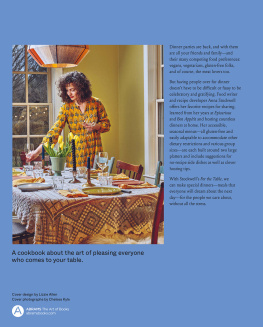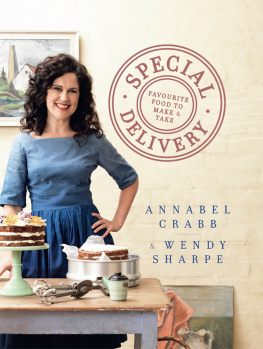Happily imperfect hosting
I wish I could be one of those hosts who opens the door to reveal an oasis of tasteful tranquillity; flawless mise en place, flowers arranged, children tucked away out of sight reading something improving, and kitchen surfaces clean as a whistle.
Tragically, this never happens at my house. A dinner party will almost always involve a major uplift of clutter from the dining room table, for starters. School bags will be shoved swearingly into cupboards. (I actually have a special word for that panicky, edge-of-tears, shoving-things-into-cupboards tidying you do when youve left not quite enough time before guests are due to arrive: crydying. Ive done a lot of crydying in my time. Not to be confused, of course, with procrastibaking, which is when you make a cake in order to avoid cleaning out the fridge.) It will suddenly be discovered, five minutes before the guests arrive, that there is no ice. Ill gaze at the kitchen walls in an idle moment and realise how hellishly grubby they are. And the three elegant courses I planned and prepared never flow as smoothly as I pictured; suddenly Ill realise that a whole bag of herbs need picking over, or the dressing isnt done, or its 9pm and Ive forgotten to serve any food at all yet.
I once decided to cook slow-roast lamb for a large group of friends and realised, at the end of four hours, that the oven had malevolently switched itself off at the sixty-minute mark. I baked a dessert tart for Penny Wong that collapsed entirely, covering the floor of the oven with lemon curd. Why? I still dont know why that happened. Ive made possets that curdled. Pasta that congealed.
Heres a tip: never try to make fresh pasta for more than six people.
(Heres another: once youve published a cookbook, your friends pleasure in your kitchen disasters will soar exponentially skyward.)
Ive come to terms with being an imperfect host. Dinner parties are great, but they are largely governed by a dreadful rule. In general, the better time the host is having, the higher the likelihood that militaristic order in the kitchen will break down. Culinary disaster may ensue.
But heres the thing. You dont have to stage a three-course full catastrophe to achieve the real point of hospitality, which is to have a nice time and be generous to your friends. And over time, Wendy and I have realised that the most satisfying way of cooking for friends is to catch them when everyones expectations are low. Throw together a last-minute lunch or dinner when your friends just drop in and fail to leave again. I know that even the term throw together is annoying when you cant be expected to have all the right ingredients on hand for something fancy. But there are some ingredients with a good shelf-life that can be kept on hand to make easy dishes that will delight a guest whos not expecting much.
Or maybe do one thing just one, like a cake and make it incredibly fancy or just very generous, like a big slab cake. Ask your friends around for a cup of tea and surprise them. Ask them around for a meal that isnt usually an entertainment proposition, like breakfast or a late supper. Ask friends who genuinely dont care that your house is a mess. And instead of labouring over an intricate feast, show your thoughtfulness for your friends in other ways; if theyre vegan or gluten-free or Muslim, cook something that works for them but isnt obviously an afterthought.
Cooking for people in your home isnt about showing off. Its about delighting the people you love, while also remembering to actually spend time with them, not weeping in the kitchen as you espalier a dozen quail or whatever. (And yes, I know thats not even the right verb.) My dear old friend and partner in cookery writing, Wendy Sharpe, is an odd cocktail of kitchen impulses. On the one hand, she will not hesitate to cater a friends entire birthday party/wedding/childs christening, even if it involves three days work and a million canaps. On the other hand, she will routinely declare herself too lazy to grate cheese.
But isnt that what cookings about? Its entirely subjective. Wendy has worked out the things she finds stressful (fancy birthday cakes, for instance) and hit on ways to avoid them. She has also utterly convinced me that there is no disgrace in serving the same dish more than once. If youre good at cooking it, and your guests like it, then keep on serving it!
So dont be menaced by expectations of multiple courses and pressed linen and children who waft off to bed at 7.25pm. Look after your friends, be generous, and trim the sails of your culinary ambition. In the end, cooking for others is an act of generosity. And that means knowing their needs, and being able to cater for them in a way that doesnt feel like youre making a great effort; thats the ancient principle of hospitality.






















